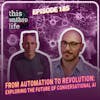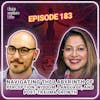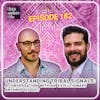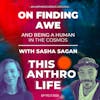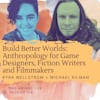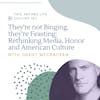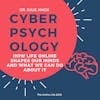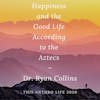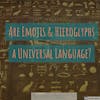Death Work: The Life and Culture of Forensics with Lilly White
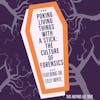
When most people think of forensics or forensic anthropology the first thing that comes to mind are TV shows like CSI or Bones, or maybe in Six Feet Under.
This may sound overly obvious, but people die every day. And this means that every day someone has to deliver dealth notifications to next of kin, especially when people live apart. Often times coroners are the ones who deliver these notifications. Coroners are elected or appointed public officials whose primary duty is to determine and certify cause of death.
and while they have the scientific knowledge to do so, sometimes with the help of apps and digital tools, the social part of dealing with death, both for next of kin and the coroners themselves, is often ignored.
We all experience death at some point but across 2020 more people have been directly impacted by death than ever before due to COVID-19. Meaning that more people than ever are receiving death notifications, which was a difficult conversation even before the pandemic. These notifications are challenging to give, Imagine knocking on a door or picking up the phone delivering the news that someone has passed away. It’s essential work. And it’s not easy. It’s also deeply social and cultural.
This is why I’m talking to Lilly White a forensic anthropologist who focuses on the cultural side of forensics, especially on the lives of coroners and medical examiners and the best ways to handle death notifications. Lily got her PhD from the University of Montana in 2019 and currently owns and operates Bones and Stone Anthroscience with her husband.
So today we’ll be talking about how cultural anthropology can play a role in forensic anthropology especially with death notifications.
Top Takeaways
- We dig into the unseen/secret life of coroners (from a cultural perspective)
- Death notice work is essential but emotionally difficult so there’s a struggle keeping coroners in the practice
- The challenges of scientific training and having to deliver the worst possible news; the mix of scientific and social knowledge
- We’ll open the conversation like I often like to do, with Lily’s story and how she found her way into forensics and forensic anthropology, what life is like training to be a coroner, and her path to running her own forensics business today.
Read about Lilly’s work in NYC with COVID-19 deaths (University of Montana)
Lilly’s Instagram: Bone & Stone Anthrosciences (@deathphd) • Instagram photos and videos
Episode art: Sara Schmieder
--- Send in a voice message: https://anchor.fm/thisanthrolife/message Support this podcast: https://anchor.fm/thisanthrolife/support
Adam: [00:05:13] One thing I like to begin with is a bit of your superhero origin story and how you came into the land of forensics, even if that was the starting point, like how did you get into this arena of anthropology? And was it like a fascination with the Adams family back in the day, or did you,
Lilly White: [00:05:32] Yeah, well, they're always that. I think I always leaned into morbid. So, I had an eighth grade science teacher that for extra credit we could go to the cemetery and study graves and study death in our family and I was into it. So I actually did extra, extra credit and went to the mortuary and interviewed the mortician and talked about things.
So I always had a morbid side. But right out of high school, I got into beauty school because it was always an interest of mine. And I knew that I didn't have to have decent grades. I could go C level grades and did my share of partying or whatever through high school.
And knowing that I had a C level to go to beauty school, that's what I did. And so right out of beauty school within about a year I opened my own salon. after I was newly married and opened my own salon and had that for 20 plus years. And ended up getting in a car accident on the way to do a bunch of girls for prom.
I was about a block and a half from the salon and I got run into behind from a supposedly narcoleptic police officer and got injured. And from the injury, I ended up with surgery to have four muscles and two ribs removed. And so it sorta took me out of the hair business for a while.
So my option was, well, I have nothing else. So I decided to go back to college or go to college. I hadn't been to college yet, so I went to college and wanted to do it kind of a quick, fast, dirty, degree. And so I went to MSU Billings and went for a communications degree. And so after about the first semester or two my advisor came to me and said what are you doing?
You've had 20 years of communication with clients and business owners. And she said, you don't need a communications degree, extend yourself. And so what are you interested in? And so at that time I had a death dying and medical ethics class that was really interesting.
Dr. Dave Carnos was the teacher and it was every hot topic on death, dying and medical ethics, abortion, euthanasia, everything, that sort of got my ire. And so I said well, that's fascinating. I think that's a fascinating topic. And so the advisor said well, in what way could you use that?
And in what way could you make that into a career? And so I thought, well maybe I could run for coroner. And so sort of through this I went to the coroner in the county that I was going to school in and set up an appointment and made an appointment with him and showed up to do.
My idea was to do an internship with the coroner. And so I showed up this one morning, at 8:30 in the morning and he showed up and he said what are you doing here? So I said well, I want to do an internship. And he's like what does that, what's an intern? And I said well, I would just shadow you for a year.
It was awkward. Yeah, he was awkward and I was awkward. And he's like, well, do I pay you? And I said, no, actually I pay. So I pay in college credits. And then, I have this list of what I should be doing and how I should behave and I turn these things in and so he's like, well. Sounds good. I don't, I don't get it. I think it's weird, but, I suppose, and so we talked for about an hour just sitting in the office and he got a phone call and he, Oh, yup, yup. Okay. All right. See you in a few minutes, okay? Yup. Hung up the phone and he got off the phone and he said, you ready?
And I said, I don't know. Ready for what? And he said, well, it's your first autopsy. So yeah, this is about an hour into my internship interview. And so I rode with him, to the morgue, the County Morrigan so I'm thinking. Shit, I have nice clothes on and I'm trying to make a good impression and we're close to the morgue at that point. And I said, so do you have any like sniffers or anything like that? And he's like no that's in the shows, that's in the movies, follow me. And so I followed him into the morgue. And he motions back and hands me a piece of gum and he said we use gum.
Adam: [00:10:31] That's funny.
Lilly White: [00:10:32] Yeah. And so , that day I went to my first autopsy and it was good. It was a man in his sixties. And sort of watched this with big eyes and so the medical examiner was there and the coroner and the coroner, when we went in, he said to the medical examiner who had a Hawaiian shirt on, he said it's my new intern, and they were like an intern. Oh,
Adam: [00:11:04] Fancy, fancy coroner.
Lilly White: [00:11:06] You're stepping up. So that was my introduction into forensics and to coroner work and to medical examiners, into dead bodies. so I followed him in and because sort of through this really quick and dirty degree. It took me two years and a semester to get through this degree. I was thinking about death and dying, medical ethics, how to sort of work death, dying and medical and ethics into a new career in a new life.
In order to be a coroner you need 40 hours of training. And so to me, I was thinking, well, Where's the biology? Where's the science?
And so to me I wasn't comfortable running for a coroner or running for a coroner position without knowing the science of a dead body, which is what long story short got me into forensic anthropology. So then that's when I went into forensic anthropology because I wanted to know what happens to a body when you die
Adam: [00:12:17] In this case like it is forensic anthropology, that was a course of study, there was a set track of things to learn. Is there not, this is me actually being ignorant. I don't know. Is there not a coroner educational program that is, like would you take biology otherwise? Like if they didn't have an anthro program, I guess.
Lilly White: [00:12:39] As far as a coroner educational program that each state has their requirements for coroners. And for the most part, well, it's divided. There are states that are coroner only states, there are states that are coroner/ medical examiner states. And then there are states that are medical examiner states. And the medical examiner states require a Medical degree. In the combination of medical examiner, coroner states, coroners usually work with medical examiners. And then in the coroner states, there is no medical examiner and the coroners do the investigation and they determine cause and manner of death. And so in Montana it's technically a coroner state, but Montana uses medical examiners. In the state we have three or four medical examiners, a couple are in Missoula and a couple are in Billings and quite a ways away.
And so in Montana we have 56 counties. So we use coroners in those counties. And so the coroner determines the manner because they go to the scene, they investigate the death, and then if they decide or determine that they need help then they go to the medical examiner, or if they need an autopsy, they go to the medical examiner. So if they don't, if they can determine cause and manner without the medical examiner, they can do it on their own.
Adam: [00:14:04] So there's the coroners and the medical examiners. And then in this case, what that means with the medical examiners having an MD or something similar. And so they, but there's fewer of them. Is that just because the educational program takes longer, or is it just but so does each county have a corner to more or less or,
Lilly White: [00:14:20] Yeah each county has a coroner and I think there's only a couple of counties that they share their coroner, but each county has a coroner. It’s an elected position, plus the coroner can also appoint deputies.
SoI live in Missoula currently and there I also live in BigFork, but in Missoula, I think there's, there's probably 15 to 20 deputy coroners, but the main coroner is the sheriff. And so he was elected and so he was chosen to be the coroner.
And so he has deputies and then those deputies get trained as coroner, but in order to be a deputy coroner or to be a coroner, the only requirement is a 40 hour basic coroner course. And then every two years you have to have 16 hours of continuing ed. Okay. So that's the coroner training.
Adam: [00:15:18] Okay. And, and this is like. Sorry, getting studied in, like how to determine causes of death and manners.
Lilly White: [00:15:25] Yup. Yup. Okay. And, and so some of my interest in this realm and sort of going into this coroner interest in my forensic anth was I went to a lot of coroner training courses, even when I was going to college that weren't required, but that I went to just to beef up, to sort of support my forensic anth training.
And so I went to these coroner courses that no other forensic camps were at, and they were just coroners at these, and the coroners ended up being, for the most part, law enforcement but some were civilians. And so they didn't know what I was doing there. And of course I was there at a coroner training, so I was getting the training.
But it was interesting to me because, I would say to the coroners does this training suit you and is it good enough? And, and do you feel like after a 40 hour course that you know how to do this? And they're like, no, no, absolutely not. I mean, it lets me know sort of how to file a death certificate and how to make this whole thing happen, but it's not enough.
And so it was interesting at one of those coroner conferences. Me being sort of the token forensic anthropologist at this conference or at this training one of the coroners came up to me and he said, aren't you a forensic anthropologist? And I said, yeah, I am. And he said, so what can you do for me?
And I said, well, I can help you with skeletal remains, I can help you locate remains, I can help you with clandestine burials. I can help you with a lot of these different things. And so I was talking about the more of the sciencey things that I can help him with and that we as forensic anthropologists do for them.
And he said well, but don't you do cultural things? And I said, yeah, I do and he said, well, so that's what I need help with. He said, I don't need help with the remains or the body. He said, there's an app for that.
Adam: [00:17:50] Of course there is. Right.
Lilly White: [00:17:54] Of course there is. Of course there is. And I actually share those apps with my coroners that call me. So he said, we need help with the cultural part. And you know, I mean, it was like, duh in my consulting or whatever, I help a lot. They'll call me and they'll say Hey, Lilly I have a bone. And so I say send me a picture of the bone and then I can determine whether it's human or non-human.
And if it's human then we go from there but that's a small portion of what we can do. So I ended up my, a lot of my training programs and a lot of my teaching and different things that I did with coroners was what do you need from me? And so it sort of extended it into sort of the ethnographic realm.
And where instead of me telling them what I could do for them, I said, what can I do for you? That to me was the rewarding part because like talking at them and telling them, now here's this bone and here's how you identify and yes, it's human, or it's non-human, or here's what I can do for you. I think anybody can do that. I think the part that they struggled with was the human part. And how do I do this human part? And so that was the part that does it, that's the part that does it for me.
Adam: [00:19:17] That's so interesting too. And I actually, I love the don't you do cultural stuff? It's like yeah.
Lilly White: [00:19:20] I was like
Adam: [00:19:22] You know, I had never thought of it. Yeah.
Lilly White: [00:19:23] You know, we've been taught that as anthropologists, we do the four sub-disciplines and so we all learn linguistics, archeology, physical or bio arch. And then the cultural, but I think cultural gets lost. I think that part about how to be human or the human experience gets lost. And it definitely gets lost in forensic anthropology. Yeah. And I'm sure I'm going to get shit for that, but it gets lost. It gets lost in, they want to make it more sciency and they want to make it more, I dunno. Credible.
Adam: [00:20:03] So it feels more scientific versus interpretative maybe.
Lilly White: [00:20:10] Right. And so, I had lots of pushback from the like even choosing my topic, especially in the PhD realm because it wasn't very sciency. It wasn't very forensic anthropology, like I wasn't measuring bones and I wasn't using cladistic trees and I wasn't doing cladograms. And I wasn't looking at isotopes. I was looking at the human element and there was pushback and it rubbed people raw. And I actually had one of my previous advisors that told the PhD Committee that I was sort of going through the backdoor to get my PhD degree by sort of going in the cultural realm. So, right.
Adam: [00:20:58] As a cultural anthropologist, I identify with that. So I think maybe let's think about this. Let's break down a little bit. What is forensic anthropology? Cause we kind of see now it's like talking with.
But I love the idea of responding to coroners and medical examiners. But let's think about that in relationship to your dissertation being this rogue research that doesn't seem to fit in what this category is. So this is a good way to kind of set up how these two pieces fit together. What's forensic and how did your diss.. research and it has it like how's it a no, no, or the side door. Right,
Lilly White: [00:21:28] Right, And so there's several definitions of forensic anthropology and so one of the ones is sort of, how do we use anthropology theory and methods to approach law. And that's especially concerning sort of skeletal or human remains. And so that ends up being sort of a definition. I mean, it's a loose definition and forensic anthropology. So you're applying law to human remains and then sort of helping law enforcement or anybody that needs your help. To assist them to assist law enforcement, to assist death investigators so that ends up being the forensic/ law part of it. And then the anthropology, the forensic anthropology a lot of it focuses on the human remains. That ends up being the forensic anthropology angle
Adam: [00:22:22] Is it primarily or almost exclusively related to essentially law enforcement work in like after death, like investigations.
Lilly White: [00:22:31] I would say yes, and I imagine some people would argue with me but what ends up happening is we end up getting calls, like in order to initiate me, to use me as a consultant, I have to get a call from law enforcement. And so, I get fairly regular calls from coroners, death investigators, medical examiners, sometimes attorneys, things like that, and they want to know what I think about something. Or they want to look at a cold case. They want to look at a current case. They might have a clandestine grave that they need. So. I don't start anything without getting a call first. Okay. So, it sort of, I can't actually do my work without having somebody contact me.
Adam: [00:23:23] So you're not, you're not a vigilante forensic.
Lilly White: [00:23:28] No, but I'm sure that there's a show in that. Exactly. Yeah. I mean, create my own work.
Adam: [00:23:29] Yeah. Yeah.
Lilly White: [00:23:31] Not that I haven't actually, I have a friend that's a forensic psychologist that I did a workshop with her at the American Academy of Forensic Sciences, last I think, February or March. And she's written, I think, a thousand books, and she said, Lily, I see something here between forensic anthropology and you as a hairdresser. And so I'm like, okay, so are we sort of going Dexter? And she's like Dexter/ forensic anthropologist. Bones/ Hairdresser, Steel Magnolias
Adam: [00:24:20] You can solve murders from the hairdressing salon. In the back there's like a forensic tape, like a forensic analysis lab.
Lilly White: [00:24:30] That was after a couple of wines, but I didn't pursue it further, but she's convinced that it's an angle
Adam: [00:24:38] That's, I like it all right. So with this stuff, so we have this idea in the broad sense of what forensic Anth is and how it relates to law. And then you kind of mentioned before that some of your training, some of the professors for your PhD were not quite sure if your dissertation fit in with the traditional categories. I'd love to get into, is it, air quoting scientific versus humanistic? Like how is that barrier seen let's talk about what your research was and like, how did it kind of go in the cultural door as it were.
Lilly White: [00:25:12] Okay. So I don't know how far to take this back, but, my sort of impetus for this study was during my internship, which ended up being 15 years ago.
I was with the deputy coroner one day, and we did everything. We did everything from death scenes to autopsies to, everything you need to do as a coroner. And including, we'd go back to the office and he'd show me porn on the office computers, which they would have to scrub, you know, like twice a week or whatever, cause he'd show me llama porn or whatever. But anyway, so everything, you're going to have to look it up.
So I mean he was sort of my sensei or whatever, my coroner sensei, so I just shadowed him. I did everything that he did, most of it was death scenes or going to the autopsies or whatever. And so it became this sort of visual part.
So one of the days that I was shadowing him, we went to a death notification. And he was a civilian coroner, so he had no law enforcement training. He had been a civilian coroner for like 27 years. And so he was good at his job. He knew what he was doing. He had been at it for a long time.
And so we went to this death notification, and so we met this nice family and he basically told them that their loved one was dead. And so we went through that process and we walked out. And as we were walking away from the scene, he said, well, I really F’ed that up. And I said, really?
And that really struck me because I didn't feel like he did, like his perception and my perception were different. And I said, well, I don't think so. And he said, no I did, I definitely did. And so then I started thinking about it and I thought, well, if that was his perception, what was their perception.
What was the family's perception? If he thought he fucked it up, then what did they think? And so that really sort of stuck with me and stuck with me for a long time. And I dealt with and talked to coroners over that 15 years about that human element and how the human element matters to these coroners more than the science element matters to these coroners. Because mind you, these coroners aren't scientifically trained for the most part. Some are, but many of them aren't scientifically trained. They're trained in humanism and they're trained in compassion, and they're trained in law enforcement often.
And so the thing that most of them needed and required was the human element and how to make the human experience better. Actually how to make their interactions better, but also how to stay in the business longer and how to be resilient from that really difficult work that they do.
And so my thing was, once I got into forensic anthropology, and once I went to this second and third and fourth degrees that I went into, I kept preaching that, listen. I know I'm in forensic anthropology, but what people have told me that are in this business is that they need the human element.
I mean, science matters to them. And how bodies decompose matters to them. And TAF anomic processes matter to them. And time since death estimations and these things matter to them, but what matters to them more is the human part.
However the people that were, advising me, weren't crazy about that. There wasn't really a place for it in forensic anthropology. So that was the pushback. And that was the sort of frowned upon. And I think I was even called a rhino because I tried to rhino my way through the push to have this be my topic was radical and a little too provocative.
Adam: [00:29:32] Interesting. So I mean it seems interesting because if you were doing a PhD in cultural anthropology, that would totally fly. Right? And so I guess that means that the flip side then is like, a lot of the training was on things, like I've said the word taphonomy is that like the time since death, like measurement
Lilly White: [00:29:47] Yeah and what happens to human remains after death. Yeah. So soil, animals, maggots. We know what happens to the body after death. So that's the taphonomic processes.
Adam: [00:30:01] Okay. And so, and that was more like when, so as training, PhD training was more like that in terms of doing field projects where you were working with the same coroner during PhD also, or did you hop around?
Lilly White: [00:30:10] I worked with what I did with my, my PhD turned into a qualitative PhD rather than a quantitative. So I ended up doing ethnography interviews. And so what I did was I asked them what was important to them.
Adam: [00:30:29] Yeah. There you go, that’s the method right?
Lilly White: [00:30:31] So bizarre. Yeah. Yeah. So, yeah. Yeah. It's how you're supposed to do qualitative.
Adam: [00:30:40] That's it. That's what I would think
Lilly White: [00:30:41] Yeah. Right.
Adam: [00:30:42] And so tell me what, what are some interesting stories that came out of that? I mean, so I've been totally fascinated. So you, you talk to both coroners as well as families around death notices, in what did you find, I mean, was it part like business analysis where it's like, okay, here's how we can improve the business. Other side is how was that, what does that work like for you? You know, talking to families after about a dead notice.
Lilly White: [00:31:00] Well, it was really interesting because, I came into this thinking that I could teach coroners how to do a better job with next of kin because I really had sort of an impression and initial impression or a hypothesis, that, maybe coroners don't do it so well, and that families need it done better. And so that was sort of my, my hypothesis. And so as it ends up being with lots of research, you throw that out,
Adam: [00:31:28] Like I have an idea, nope.
Lilly White: [00:31:29] And so that was my thing was I entered this, I did grounded research. Which was another unpopular thing. So anyway, but I started with this sort of working theory or whatever that maybe I needed to teach the coroner's something. Well, the coroner's taught me and the next of kin taught me. And so what both of them taught me was that giving a death notification is extremely difficult.
As well as receiving a death notification. And that one isn't easier than the other. And that what they told me is that it was interesting because a lot of the coroners were trained to be empathetic, but keep interactions out and sort of keep your emotions at bay, be sort of methodical. Be sort of robotic in the way because people don't want to see you break down. They don't want to see emotions or whatever. And then I had a lot of next of kin say to me, I want to see the human element. I want to see that they care. I want to see that they realize that I've lost a family member.
I want them to be kind, or I want them to hug me. I want them to stick around for a few minutes. I want them to ask about my loved one and most of my coroners said it kills me. It's difficult work. I don't leave unscathed. Every one of them adds up. And I don't know how to keep doing this well.
And yeah. One of my people was a young girl who was the coroner in this case, and she had done 1500 death notifications. And she had said to me, well, it doesn't bother me that much. I'm just used to it as part of my job and it's what I do. And yet, within our interview and within our time together she broke down and it struck her that she said well, I thought I was tougher than that. I didn't expect myself to break down. And that really surprises me.
But they're even the ones that were trying to be this is just my job. This is how I do it. This is how I was trained. They just can't help but be human. They can't help but realize the job that they're doing. And that so many of them say, I'm delivering the worst news in the world. And then yet I go back to my job or that maybe I deliver two more that day, or maybe I deliver four more that day or that I go back to the scene with the dead body, the science part.
I go back to the scene and then deal with the body. And you know, I mean, I, I found myself feeling like we weren't doing enough for the coroners and I felt the same that we weren't doing enough for the next of kin.
Adam: [00:34:56] So that's so interesting too, cause you don't always think about the coroner, right? You kind of think about the family in this scenario.
Lilly White: [00:35:03] Well, and it was interesting because when I was trying to sell this idea, which was, thank goodness I'm a bit of a salesperson, but when I was trying to sell this idea to. First of all, my chairperson and then my committee members said well, it's their job. Who cares? You know, basically it's their job. It's what they do. So where's the magic in this? What's the mystery? What's the magic? And I said, well, it's part of their job but a lot of these coroners that's a small portion of their job, but it's a really emotional, difficult part of it. And maybe we could make it better for them. And, and actually I had a hard time trying to convince some of these anthropologists that this was a worthwhile study.
Adam: [00:35:53] That's so interesting. I mean, obviously coming from the totally outside, I don't see where the conflict is there, but I understand that it's there. And just thinking about labor in general, right? Like seeing people like well, this is their job. And that's enough to say we shouldn't study it is very interesting.
Lilly White: [00:30:54] Yeah. Yeah. And I mean my thing with some of these cultural anthropologists was well, we study other, and so we don't study our backdoor.
And so to me I kept saying well, listen this is backdoor anthropology where this is out our back door. And I'm talking about studying something that happens to every human, it's universal. We should know how this works in the real world, you know?
And we're not othering. We're talking about real problems that happen. And then how do you move forward? And also a lot of coroners are law enforcement. And so to me, I was thinking how do we make that connection between law enforcement and sort of civilians?
And how do we make that better? Well, making this, this part or this interaction or this communication better, it could start here, you know? And so I had a hard time with my cultural people to have them say, Oh yeah, this is worthwhile.
Adam: [00:37:17] Hmm. Interesting. That's so interesting.
Lilly White: [00:37:20] Yeah. And actually I'm sort of in that realm of death, dying people.
So they're like, well you fit into this end of life care and this palliative care program or whatever, but I'm not sure where you fit in. Otherwise you're creating a new genre or you're creating a new thing that doesn't exist. So yeah, there's pushback.
Adam: [00:37:45] I feel like there's some kind of metaphor there where it's like in death there is space for new beginnings, literally in this case, you're making a new career.
Yeah. As kind of a wrap up question. So you and your husband have this business, Bone and Stone Anthrosciences, which is a great name. And so you both do like forensics and archaeological material and remains analysis?
Lilly White: [00:38:05] No, actually we're both anthropologists. And so he was, he's trained in, well, we're both trained in all four of the sub disciplines, but his specialty is in artifacts. So we joke about it and so he deals with objects and I deal with bodies.
So being consultants for that, then he's better consulting with artifacts and things like that. And I'm certainly better at doing human, but we've crossed over. So I've brought him along to a couple of my forensic calls and so I don't get asked on many of the archeological digs on his angle, but it's moving forward. That's sort of, I need to find a space in there where they accept sort the of forensic anthropologist, but I've brought him over into my world.
Adam: [00:39:00] That's cool.
Lilly White: [00:39:02] He's done some exhumations and things like that. So we get coroner calls and, and I drag him out with me on the coroner for calls. So
Adam: [00:39:11] It's funny cause you don't yet have your vigilante forensic business, but I think it's coming, like the pieces are all there, right?
Lilly White: [00:39:18] That we know of.
Adam: [00:39:19] Yes. That we know of. Yes, exactly. Maybe as it's kind of a brain teaser, last question, what'd you think about when you first started doing forensics? Like when you walked in that coroner's office what'd you think it was going to be like? And then what's different now 20 years later.
Lilly White: [00:39:34] Oh wow. It's a big question. I know. That's a good question. What did I think it was going to be like? Oh man. I didn't know dealing sort of with the Morticia Adams and sort of the Wednesday, Pugsley kind of thing. I'm that type, what’s that bumper sticker that says I poked dead things with a stick.
And so, I mean, part of me, it was just a strictly morbid curiosity. We had a lot of deaths in our family, in ‘92, we had four deaths. I'd been on the death realm. And so I sort of wanted to step into that realm. I actually, as a hairdresser had done hair for people that have passed away, sort of the beautification part of death.
So that whole thing sort of fascinated me. And so then what has it become, there's way more to it than I ever anticipated. And to me, I think we do a huge disservice to the forensic community when we ignore the human element. And so I mean, if I could do anything, I would say to bring human experience into the forensic anthropology experience and actually to bring humans into the forensics instead of microscopes and testing and things like that. I think you have to always think about the human element and which is what I'm hoping to do. And so I'm hoping to poke the live people with a stick and instead of just the dead people.
Adam: [00:41:14] That's a fair point. Yeah. That's your other bumper sticker. Right? Like I also poke living people.
Lilly White: [00:41:20] Right Yeah so I'm hoping to do that. I mean it's a challenge.
Adam: [00:41:27] It is, right. It's ongoing, right. It's like you must go and must keep going.
Lilly White: [00:41:29] Right.
Adam: [00:41:31] But I want to say, Lily, this has been amazing and thank you so much for sharing your stories with us.
This is such an interesting framework that again, I think a lot of us, we all know death is there, right? But we don't always think about it. Right? And it's great to know that just forensic anthropology as a field is really quite diverse. I mean, you're helping diversify it too, which is good. And bringing in different questions.
Lilly White: [00:41:51] Yeah. Yeah. I'm hoping to, actually, when I started, one of my fund advisors said there's no work in forensic anthropology unless you stay in academia. And I don't know that she's wrong. I mean number one there are no jobs in academia, so good luck with the whole thing. So, I thought, how do you create what's out there? So she wasn't wrong. I mean, she was saying know this stuff, figure out how to work this stuff or whatever. But then if you want a job. Then you have to figure out, get creative. So I've tried to remain creative.
Adam: [00:42:32] Yeah. Well, it seems like, I mean, having been creating a business around it, I think is one of the good things. And I think we're going to see more anthropologists because there's no job that's anthropologist for the most part. Right. But you put an entrepreneurship with that, and you can then find, you could be a forensic anthropologist, you could be a podcast, or a media producer. Who knows, right, there are ways but it's like. So part of it too, I do think about teaching anthropologists to be entrepreneurs, right? Like, it's okay to make your own business and you kind of have to sometimes.
Lilly White: [00:42:59] I've listened to your podcasts about sort of creating and recreating anthropologists and I love the idea that research and anthropologists that move in to experience research and experience design and user design and the thing is that what may not be appealing to too many anthropologists is that it’s sort of is in that tech world.
And so how do we move it then from the tech world into the human experience world? You know? And so you want to stay relevant and interesting for businesses. And so you want to be able to offer something but you also want to like your job and you also want to like what you do. And so do anthropologists take those jobs as a designer? And so do you create what they want you to create or do you create what you want to create? I want to create what I want to create so I might be unemployed for the rest of my life, but I'm going to stay creative with it and see what happens. And, you know, sort of keep it up.
Adam: [00:44:10] Yeah. That's the way. Yeah, we're going to check in with TAL like in a year and see if you had like a hair death business or something. You know what's come out of this,
Lilly White: [00:44:21] Right, Dexter plus experience and yeah. Steel Magnolias slash Dexter.
Adam: [00:44:46] Right. There you go. Yeah. I mean, it's right there. You got it. See that, it's like it's your own theme park now.
Lilly White: [00:44:31] Right, right.
Adam: [00:44:36] Very cool. Well Lily, thank you so much for talking with us today. This has been super fun.
Lilly White: [00:44:41] Thank you for having me too.
Adam: [00:44:43] Definitely. Let's do it again. It's actually excellent. I know you have much more research and much more stuff you've done, so we've got more to talk about.
Lilly White: [00:44:45] I've got provocative stuff that I'm sure would be interesting for. Certain viewers.
Adam: [00:44:51] Yeah, that's right. We can make a bonus episode for that.
Ready to Explore Humanity’s Creative Potential?
Check out some of our most popular episodes that are great to start with.





















